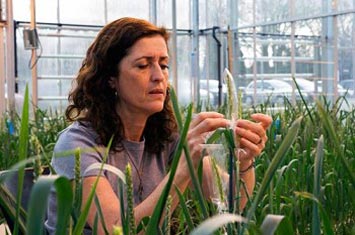GENETIC VARIATION AND DIVERSITY TRANSFER ACROSS DIFFERENT GRASS SPECIES
 International Women’s Day on March 8, offers an opportunity to recognize the achievements of women worldwide. This year, CIMMYT asked readers to submit stories about women they admire for their selfless dedication to either maize or wheat. In the following story, wheat breeder Jessica Rutkoski writes about her Super Woman of wheat, Julie King, a research fellow at Britain’s University of Nottingham.
International Women’s Day on March 8, offers an opportunity to recognize the achievements of women worldwide. This year, CIMMYT asked readers to submit stories about women they admire for their selfless dedication to either maize or wheat. In the following story, wheat breeder Jessica Rutkoski writes about her Super Woman of wheat, Julie King, a research fellow at Britain’s University of Nottingham.
Wild relatives of wheat are of particular importance to wheat breeders trying to develop disease-resistant and high-yielding varieties that can tolerate various environmental stresses, including drought and poor quality soils.
These wild grasses, cousins to the ancestors of modern-day wheat, provide a vast and largely untapped source of genetic variation for almost all traits important for wheat growers.
Plant geneticist Julie King, a research fellow with the University of Nottingham, has developed a new strategy for transferring genetic variation and diversity across different grass species. This strategy is now being used to transfer genetic variation into wheat from its distant relatives, which carry key disease resistance and stress tolerance genes. Very few people in the world are capable of this work, and so Julie plays a key role in adding new variations.
By crossing wheat with its wild relatives, a painstaking process, Julie and her research team aim to improve the ability of wheat to tolerate heat, drought, and salt – of key benefit in a world where freshwater is going to become even more scarce amid changing climate and population pressures.
Working with wild relatives is very difficult and not many people can do it – it’s like magic. It almost takes super powers to overcome the many barriers that can prevent hybridization of the species – so many crosses fail.
Any views expressed in this article are those of the author and not of the International Maize and Wheat Improvement Center.
 Gender equality, youth and social inclusion
Gender equality, youth and social inclusion 
